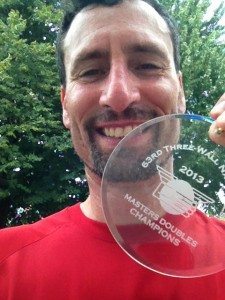 By Dr. Dan Zimet, Psychologist & Sports Consultant-
By Dr. Dan Zimet, Psychologist & Sports Consultant-
While coaches and athletes often comment on the importance of mental skills, in reality very few take the time or effort necessary to assess, practice and emphasize mental toughness. Brad Gilbert, coach of Andre Agassi and author of “Winning Ugly,” believes that mental skills provide up to a 20% edge. Furthermore, these mental skills are more important for the less skilled player. Preparatory or Pre-Competition Skills are utilized in the time leading up to and just prior to a competition as well as stoppages in play (e.g., between games, a time-out, or prior to serving/receiving serve). As you will observe, many pre-competition skills overlap or are equally effective as competition skills.
Pre-competition skills include:
- Routines
- Know your opponent
- Visualization/mental imagery *
- Self-talk *
- Breathing exercises *
* Key mental skill useful for pre-competition and competition conditions
Routines – Showing up prepared
Everyone knows that it’s an advantage to walk on the court fully ready to play. The period of time leading up to playing a match can be nerve-wracking, and the anticipation tends to generate a lot of anxiety and tension. Players who handle these nerves well are at an advantage as they start the match rested, hydrated, energized, loose and ready. Having a specific routine significantly helps to settle nerves. A routine is a familiar and generally fixed schedule or pattern of behaviors that starts when you begin to prepare for a match, and tend to become increasingly important the closer you get to the first serve. For many professional athletes routines are a daily part of life used to maximize training and preparedness. For the amateur athlete, routines are just as important and should start days to a week before a big event. Routines include scheduled rest, hydration, eating habits, leisure time activities, packing, social time and so on. The term ‘routine’ also refers to a pattern of behavior leading up to the execution of a skill; however we will discuss this type of routine in the section on Performance Skills.
Routines keep you moving and on-task, and transitioning you physically and mentally into the mindset of arriving at the first-serve ready to go at your most comfortable state of arousal. Your routine needs to include three domains: physical preparation; courtside preparedness; and walking on the court ready to play.
Physical preparation: Conditioning and Diet. Matches are sometimes decided before the first serve is hit, and this fact is particularly true when it comes to fitness. At best, playing a match with poor conditioning will result in a disappointing performance. At worst, you’ll get seriously injured. Take training seriously if you intend on playing to your potential. Consult with a reputable professional or other resource (e.g., book or website) to create a training regimen specifically addressing the demands of handball. For particularly big events, time your training for peak exertion a week before your first match and then reduce to light/moderate workouts for the week leading up to the event. It’s not recommended to play intense handball the week prior to an event, but if you need to get on the court try to play at 70%.
Diet is also a critical part of your training, and having the right fuel for a match is essential. The Carb Loading strategy entails maintaining a low-carb diet for three days while training at moderate intensity, and then eating a high-carb diet for the last three-days, including your pre-event meal (eaten 2-4 hours before playing). Hydrate the prior evening and day before playing, and continue up to one-hour before playing. An athlete’s regular diet should be 55%-75% cholesterol (depending on your workouts); 15%-25% protein, and 20%-25% fat. It is important to keep in mind that, as a basic rule of thumb, cholesterol is fuel (critical pre-match) and protein is muscle recovery (critical post-match). And hydrate, hydrate, hydrate.
Court-side Preparedness. There are surprisingly important advantages to having everything you need neatly available courtside. You should never count on the tournament having what you will need at the time you’ll need it, particularly during the very brief intermissions within a match. A timeout should be used for physical and mental recovery, not waiting in line for a cup of water. Here is my list of essential items to have neatly lain out (or in your bag) close to the court:
- Handball Bag that is somewhat organized (e.g., matching gloves linked together)
- Food/Fuel (e.g., energy gel packs, power bars, banana, 5-hour energy)
- Water and energy drinks (a least 32oz of each, preferably twice that amount)
- Gear: more than a sufficient number of gloves, headbands, liners, goggles.
- Clothing: shirts, socks, etc.
- Extra pair of shoes and laces
- Medical: Electrolyte pills, Ibuprofen, Band-Aids, athletic tape, bruise pad (hand)
- Towel
- Extra contact lenses and solution/eye drops
- If the tournament is outside: Cooler of ice/water mix and a hand-towel that can be drenched and put over my head/legs to quickly cool down. Comfortable chair. Sun shield (e.g., umbrella).
One common mistake is hurrying warmup once a court becomes available or arriving at the club too close to your start time. A second mistake is remaining at the club too long before or after playing. This is particularly problematic at outdoor events, where the sun and heat take a profound physical toll. It takes a massive amount of energy to keep your body from overheating. Here is an example of my pre-match routine, and I suggest making one of your own:
- Eat 2-4 hours before match time. Rest in hotel watching TV and lightly stretch. Hydrate.
- 1-hour before start time: Arrive at the courts.
- Sign in, get my court assignment and get dressed.
- Take inventory of my internal calorie/fuel/hydration and eat/drink accordingly.
- ~30-minutes before it becomes available: Set up at my assigned court.
- Warm up large muscles (jog, cycle, jumping jacks, etc.) and get my heart rate and body temperature up to the start of a mild sweat.
- Stretch, particularly muscles prone to handball injury (e.g., calves, groin, back and shoulders).
- ~10-minutes before prior match ends: Bathroom, then gear up and review my game plan.
- Court available: Throw right/left at overhand/drive/kill/ceiling three or four times each; hit overhand smooth, kill smooth; ceiling; punch ceiling; back-wall; serve
- Prior to first serve: Bounce on toes, deep knee bends, revisit game plan, get my arousal state right (deep breathing and self-talk to calm, self-talk and increasing heart rate to excite).
Know your Opponent
Having a keen knowledge of your opponent can help you formulate a general strategy of how to orient the match towards his/her weaknesses while maximizing the effectiveness of your strength. Also, knowing in advance how your opponent tends to win can mitigate frustration (since you’re mentally prepared), and allow more rapid application of prepared strategies. First, you’ll need to have a stark awareness of your assets (See Basic Skills – Confidence). Second, you will want to document key points about your opponent. While personal experience from prior matches is the best source of information, watching your opponent and talking to his or her opponents is very helpful. Take written notes on the following: strengths, weaknesses, and overall impressions of key areas (conditioning, lefty/righty, power, serve, defense, retrieving, hooks, intensity, mental ‘games’, etc.). I like to have at least a few basic key strategies at the start of a match, and always a note on how I want to organize my serves.
Next: Key mental skills

Dr. Dan Zimet is a Psychologist and Certified Sports Consultant (anticipated 2016). Dr. Zimet has been working as a Psychologist for more than 15 years in private practice, specializing in young adult and adolescent issues, marital counseling and sport psychology.
Drawn to handball because his father, uncle and grandfather played, Dr. Zimet has accrued an astounding 24 31 combined singles and doubles National Masters Titles in 1-Wall, 3-Wall and 4-Wall, while also serving as the Maryland Handball Commissioner from 2003-2013. He cites victories against Andy Schad in the 2012 3-Wall National Final and winning tournaments with partners Alan Frank, Andy Schad, Eli Zimet (father), and Adam Zimet (brother) as his most fulfilling moments in handball. Dr. Zimet has set his sights on another a top four WPH SR48 ranking and winning a USHA National Masters Title in each of the USHA national events.
Dr. Zimet lives in Columbia, MD with his wife Danielle and son Fletcher









